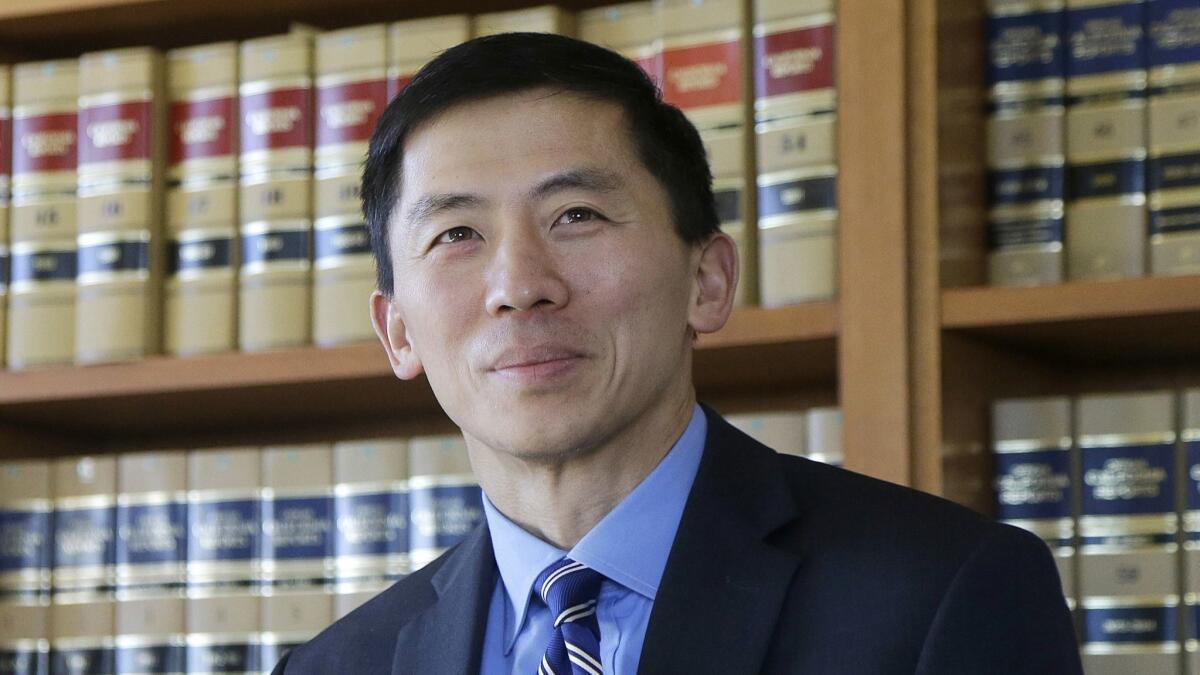2 California Supreme Court justices say the state’s death penalty system doesn’t work

- Share via
Two weeks after Gov. Gavin Newsom declared a moratorium on executions, two justices on the state’s highest court called California’s death penalty “an expensive and dysfunctional system” that delivers neither justice nor timely closure.
The California Supreme Court justices decried the state’s administration of the death penalty in a concurrence to a unanimous decision upholding the death sentence of Thomas Potts, who robbed and killed Fred and Shirley Jenks in their Hanford home in 1997.
The case was the first death penalty decision issued by the court since Newsom announced the moratorium. Though California judges have leveled similar criticism for years, Thursday’s denunciation was unusual in that it came in a published court decision.
Justice Goodwin Liu, joined by Justice Mariano-Florentino Cuéllar, both appointed by former Gov. Jerry Brown, reiterated the evidence Newsom cited when he announced the moratorium.
The capital sentence the court upheld Thursday “does not alter a fundamental reality,” Liu wrote.
“A death sentence in California has only a remote possibility of ever being carried out,” he said. “As leaders of the judiciary have long observed, the death penalty presents serious challenges for the fair and efficient administration of justice. For decades, those challenges have not been meaningfully addressed.”
The two justices also said that Proposition 66, passed by voters in 2016 to speed up executions, will not resolve the problem because it did not provide additional funding.
“In the meantime, the judiciary will continue to do its duty under the law, leaving it to the voters and our elected representatives to decide whether California should double down on the current system or chart a new course,” Liu and Cuéllar said.
They described Thursday’s decision on Potts’ appeal of his death sentence as “instructive.”
“The death judgment was issued in 1998,” they said. “Now, 21 years later, we affirm the judgment on direct appeal, but there is more litigation to come in the form of habeas corpus petitions in state and federal courts. This timeline is typical of our capital cases.”
Liu noted that he has voted to uphold “scores” of death sentences and would continue to do so if the law required it. He also said he was expressing no view about the morality or the constitutionality of capital punishment.
“It is impossible to review these cases without feeling tremendous compassion for the victims and their families, who have suffered unimaginable heartbreak and loss,” Liu wrote.
“But the promise of justice in our death penalty system is a promise that California has been unable to keep,” he added.
Both California Chief Justice Tani Cantil-Sakauye and her predecessor, Ronald M. George, Republican appointees, have said that California’s death penalty system is broken.
Referring to a comment by Cantil-Sakauye, Liu and Cuéllar said California was long overdue to have a “merit-based” discussion about the costs and effectiveness of the death penalty.
Newsom issued a statement commending the two justices for their pronouncement.
Santa Clara University law professor emeritus Gerald Uelmen, an expert on the state high court, called the concurrence “an eloquent expression of frustration.”
“I am sure it is a frustration the entire court feels but they may not have agreed that it is appropriate to express that in a concurring opinion in a death penalty case,” Uelmen said.
Justice Leondra R. Kruger, another Brown appointee, did not sign the concurrence. Justice Joshua Groban, Brown’s fourth appointee on the seven-member court, had not been confirmed when the case was heard and did not participate.
The concurrence was reminiscent of a 2015 dissent by U.S. Supreme Court Justice Stephen G. Breyer, who called capital punishment “unfair, cruel and unusual.”
That dissent, which was joined by Justice Ruth Bader Ginsburg, went further than Thursday’s state Supreme Court concurrence. Breyer was essentially calling the death penalty unconstitutional.
Kent Scheidegger, legal director of the pro-death penalty Criminal Justice Legal Foundation, dismissed Thursday’s concurrence as “nothing new.”
He said the court was partly responsible for the state’s huge backlog of death penalty appeals. It has routinely granted time extensions to defense lawyers in capital cases, he said.
“I sincerely hope the California Supreme Court will continue to follow the law and not the opinions of the judges,” he said.
Twitter: @mauradolan
More to Read
Sign up for Essential California
The most important California stories and recommendations in your inbox every morning.
You may occasionally receive promotional content from the Los Angeles Times.














